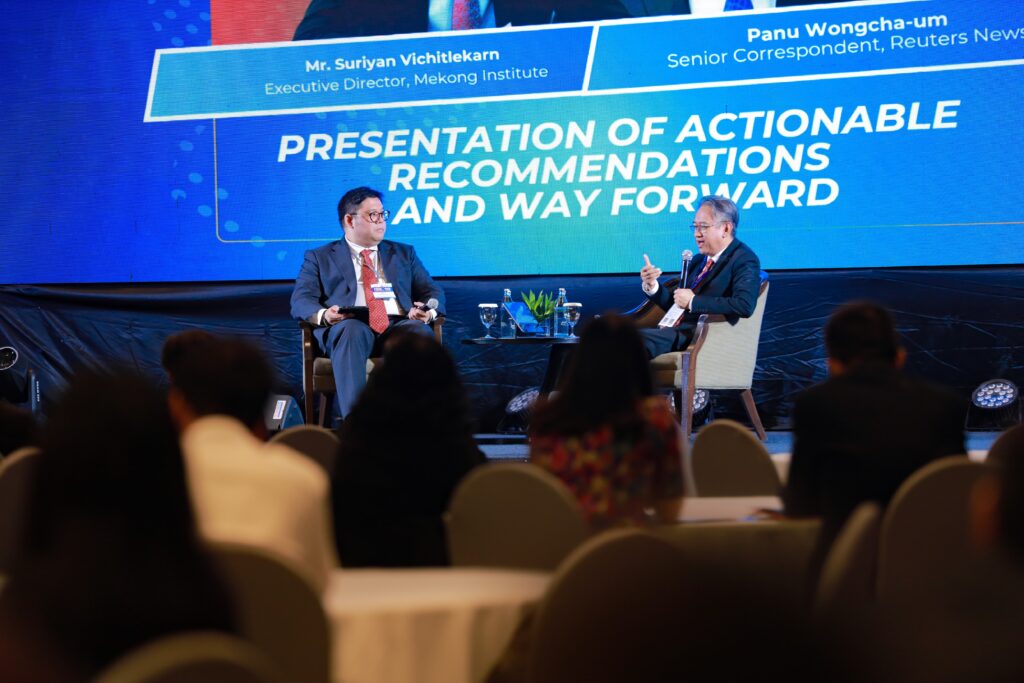As in its previous iterations, Mekong Institute (MI)’s Mekong Forum for 2024 has been a catalyst for discussions and new collaborative ideas shaping an inclusive digital future for the Greater Mekong Subregion (GMS). Held from July 31 to August 1, 2024, in Khon Kaen, Thailand, this year’s forum brought together approximately 300 stakeholders for knowledge sharing, open dialogue, and technology showcases. It sought to initiate the creation of a regional innovation strategy that aligns with ASEAN’s digital and connectivity goals, and tailored to the diverse needs and ambitions of the GMS.
Toward this end, the Mekong Forum offered seven breakout sessions, called Terrains, where the core of the discussions took place. The terrains featured over 30 resource persons who delivered presentations on key aspects of digitalization, innovation, and technology (DIT). Discussions were closely linked to MI’s priority themes: agricultural development, trade and investment facilitation, sustainable energy, environment, and inclusion of women and youth. The scalability of DIT in the GMS, with an emphasis on sustainability beyond initial financing, was also a significant topic.
Drawing from the presentations and discussions in each session, resource persons and participants collaborated to develop recommendations for the digital transformation of the GMS. Key recommendations included developing digital literacy programs, particularly for women and youth, with hands-on training and access to digital tools. Investing in digital infrastructure to improve access, reliability, and affordability in underserved areas was emphasized. The importance of engaging local stakeholders for ownership and capacity development was highlighted, alongside enhancing digital access and support for SMEs through affordable finance, business advisory services, and skills training for digital resource utilization. Strengthening strategic partnerships and knowledge transfer was identified as crucial for the advancement of the region’s digital economy and community.
In an interview segment with Reuters News Senior Correspondent Mr. Panu Wongcha-um during the closing plenary session, MI Executive Director Mr. Suriyan Vichitlekarn noted that the region faces various issues and challenges, some of which arise from development progress and new emerging issues. He said that DIT can help address these issues but emphasized that DIT is merely a tool, and the focus should still be on human capital. He said that inclusive policies and ecosystems are crucial and all efforts should address the needs of the people, contribute to better employment, and ensure that benefits are realized by the community.
“The next 12 months will focus on creating an ecosystem that prioritizes human capital, policy, and partnerships to foster understanding and knowledge. Partnerships must aim for results and action, not just sharing experiences. Stakeholders, who are not just beneficiaries but potential partners, should be engaged to define strategic advantages. While DIT infrastructure investment should start with the government, it should later be expanded by the private sector,” Mr. Suriyan told Mr. Panu.
The Mekong Forum also saw the signing of strategic partnerships with three academic institutions – Khon Kaen University’s College of Local Administration, Chiang Mai University’s Faculty of Political Science and Public Administration, and Southwest Forestry University – to foster academic and research collaboration, exchange personnel including scholars and faculty, and share information and publications to enhance innovation. The agreements include organizing joint workshops and conferences, which are expected to significantly contribute to digital transformation and smart city aspirations of GMS stakeholders.
Extending his congratulations to the organizers, MI Council Member and P.R. China’s Permanent Representative to the United Nations Economic and Social Commission for Asia and the Pacific (UNESCAP), Mr. Ye Xuenong, said in his closing remarks that the Mekong Forum has “provided an invaluable opportunity for participants to engage in constructive dialogue on the transformative role of digital innovation technologies in key areas including food, trade, and energy.” He added that the event facilitated the sharing of practical experiences and the exchange of ideas on future developments. “This Forum adds new content, injects new vitality, and makes new contributions to digital innovation cooperation in our region… This is a promising development that has the potential to promote inclusive growth and sustainable development.”
Mekong Forum 2024 is proudly sponsored by the People’s Republic of China and the New Zealand Aid Programme (NZAP). This year’s event is also co-hosted by the Thailand Convention & Exhibition Bureau (TCEB), MitrPhol Innovation & Research Center, Thailand Beverage Logistics, Khon Kaen University (KKU), Winrock International, Asian Development Bank Institute (ADBI), Economic Research Institute for ASEAN and East Asia (ERIA), World Wildlife Fund (WWF), the Australian Government’s Department of Foreign Affairs and Trade (DFAT), Stockholm Environment Institute (SEI), Chulalongkorn University, and the ASEAN Youth Organization (AYO).








